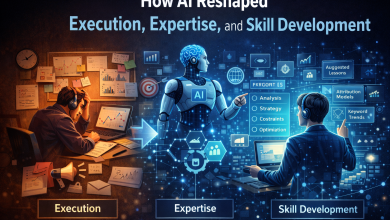
The impact of artificial intelligence (AI) on the legal industry has been an ongoing conversation since ChatGPT launched in late 2022, taking many by surprise. Nearly three years on and the discussion continues, in part due to the rapid advancement of the underlying technology and the exploration of use cases. Gone are the days of utilising AI for purely administrative tasks; we now have models that “reason”.
The conversation inevitably turns to the areas of the legal sector which are most likely to be impacted by using AI; work displacement, billing and compensation models, legal development and operations. These will all be greatly impacted when widespread adoption of AI becomes commonplace, but in our opinion, these are just the obvious buckets for AI disruption. Instead, it is much more difficult to define areas of the legal industry which will not face significant disruption from AI. So, knowing this, how do we as an industry adapt our businesses to new market dynamics and stay relevant to clients who are increasingly digital natives?
AI in Law
AI is not new to the legal industry; it has been around in some form since the 1980s. The last big AI boom in law occurred only in the last decade, when clause extraction tools such as Kira Systems hit the market with many heralding a new way of conducting due diligence review. Generally, hyped expectations around AI in law have always fallen short when faced with the reality of delivering complex legal services. The use of AI has always been curtailed by technology, and many thought it would be limited to narrow use cases, but ChatGPT’s arrival upended this thinking.
Large language models (“LLMs”) and their chat-like interface have dramatically altered the outlook for AI in legal services. Suddenly, we have instant access to our data and insights in a form and fashion that we never enjoyed before. With AI acting as an assistant, we can now generate high-quality pieces of advice or contracts within minutes, which traditionally could take days and with multiple lawyers feeding into the product. LLMs will fundamentally change how we provide services to our clients and successfully navigating that change will be the difference between the firms that remain in business and those that fail.
Why and How AI will Change Our Business
We paint a dramatic picture but the change to come is dramatic. Traditionally, legal services are human capital intensive, requiring specific expertise and creativity to develop business solutions to legal problems. In commercial law, large firms service large clients with small armies of junior lawyers at the base of the law firm pyramid, bringing that army to bear on matters where manpower is required, such as document review. While these firms have processes in place to utilize existing knowledge, automation, and legal project management, the core remains the same: highly leveraged juniors charged out in six-minute increments.
With AI, this must change, both in the interests of the client and law firm. AI will soon do the heavy lifting those highly leveraged juniors once took on, and more – it will draft, advise, train, and price work. Law firms simply will no longer need the same army of juniors to produce the same volume of work, and those firms will be able to produce that work much quicker. Clients will expect, and eventually demand, expedited legal services, leaving the idea of billing those services in six-minute increments commercially untenable for law firms.
For the law firm, AI presents a challenge (and opportunity) to our formulation of value: we have conditioned ourselves and clients alike to equate the value of our services with the time it takes to deliver them. Increasingly, AI will set apart those law firms that have deep client relationships and are able to orchestrate legal work from the advisory and strategic level to the implementation and delivery capabilities across available tools.
Larger firms that have made investments in AI-enabled platforms that feed into advice have a head start over firms that are leaving AI to others. What happens to the army of juniors? Without the work to sustain them, we believe the base of the law firm pyramid will contract. This is not an “end of lawyers” argument: We think lawyers will continue to thrive in the age of AI – instead, this is simply an acknowledgment that, in the current market dynamics, junior lawyers will not be required at the same scale and will need different upskilling than previously.
This assumes two things:
- The industry will not grow at a fast enough rate to sustain both widespread AI adoption and the number of juniors currently being recruited; and
- That new lines of business will not be created perhaps as a result of AI, which will require firms to leverage junior lawyers.
There is plenty of debate about the fate of junior lawyers, but what is clear is that they will not be performing the same tasks tomorrow at the same scale as today. Clients will no longer pay for that army of juniors when AI can replace their output, whether that output is executed by the law firm, alternative legal service providers or by the client themselves: do not forget that clients will have access to the same technology.
How to Respond:
The legal industry must embrace the change AI will bring; there is simply no other choice. AI poses an existential threat to the traditional way of delivering legal services, but those firms who adapt will thrive. The balance between what work is done in-house and outsourced to law firms or alternative providers is in flux.
Forward-thinking firms are already integrating AI into their processes and evaluating new ways to do so every day. A recent Thomson Reuters Institute survey shows a bifurcation between firms already leveraging AI capabilities and those that are losing ground by not doing so.1 The former are experimenting with new solutions as they arrive on the market and evaluating the opportunities they present. They are collaborating with their clients, helping to educate them on how AI can be integrated into their business and facilitating this.
Crucially, they are also seeking to redefine the narrative around the value their services bring to clients. Uncoupling “value” from time will, ironically, take some time to fully achieve, however it must be done if law firms are to survive. AI-enabled services cannot be charged for based on the billable hour as there is simply no profit to be made in that model, both because of the speed at which a firm can produce work and the cost of the technology: Enterprise AI is not cheap. Moving to a billing model which fairly reflects the value of advice and services (the institutional knowledge, the expertise, and creativity) and effectively communicating that model will be difficult.
AI also presents a real opportunity to redefine the role of lawyers. Not many industries get the opportunity to recreate the narrative of why they are essential and preferable to self-help. This exercise will be of paramount importance given that tomorrow’s clients will be digital natives, for whom the use of technology in business will be second nature. Our current ways of working and delivering services may not appeal to them any more than it may appeal to the firm’s future talent, and so adapting to those new profiles will be crucial – AI can and should enable smart and safe professional development.
As an industry, if we lean in and harness AI correctly, we can accelerate the development of our junior lawyers. Again, more lawyers will need the business savvy and the skills of the best rain makers to maintain trusted client relationships. Additionally, they will need the legal project management acumen to orchestrate a complex array of services that integrate AI tools, data analytics, and legal advisory capabilities across different types of service providers either internal to the firm or involving third parties. In doing so, these lawyers will be more valuable to the client (and therefore the firm), likely at a much earlier stage in their careers. Executing on this accelerated professional development should be the goal of every firm now, rather than wondering what those juniors will be doing.
In closing
AI won’t stop at legal service delivery; it will touch every area of our business from professional development to marketing. AI will mine our billing and matter data, informing our leaders on areas of profitability and where firms should be focusing resources. It will alter how we present ourselves to the market and help to identify new client bases. AI will help defend against cyber threats, while ensuring that our technology stacks hum with efficiency. All of this will, if leveraged correctly, see our businesses thrive.
The future of the legal industry can be very bright if we embrace change now and redefine the value we bring to clients and society. We must experiment with new modes of delivery, new ways of training, and new billing methodologies. Many of these experiments will fail before we find what fits in tomorrow’s AI enabled market, and that is ok. The point really is that whether we succeed or fail as an industry is entirely in our own hands.





